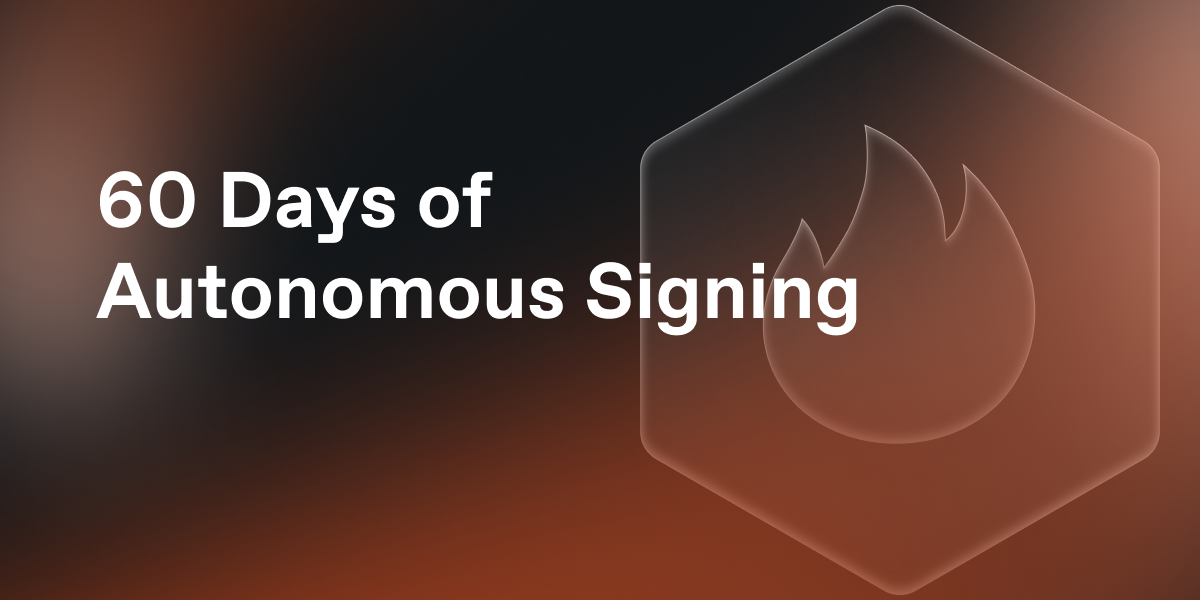60 Days of Autonomous Signing: An Update
A look back at the first 60 days of signing on the Lit Datil networks.

It has now been just over two months since signing went live on the Lit Datil Mainnet Beta, and the momentum is incredible. In this short time, ecosystem partners have demonstrated how decentralized key management can power the future of the Internet, unlocking new possibilities for developers and users alike.
This post will provide an update on the progress and usage of autonomous signing across the Lit ecosystem so far, diving into specific use cases and product launches, key performance metrics, and a look ahead at some of the new features coming to Lit in the year ahead.
Launching Autonomous Signing
Lit Protocol combines Multi-Party Computation Threshold Signature Schemes (MPC + TSS), and Trusted Execution Environments (TEEs) to provide builders with a robust network and set of development tools for managing keys and performing generalized and private compute. The Lit networks facilitates secure, decentralized, and autonomous application development, forming the backbone of everything Lit offers. Check out the whitepaper here.
When the Habanero network was released in February of this year, Lit provided two core services:
- Encryption and Access Control: Lit can be used to safeguard access to sensitive data through the use of an MPC TSS identity based encryption scheme.
- Private Compute Functions: Lit Actions are highly generalizable JavaScript programs that dictate the logic Lit keys use to perform signing and encryption / decryption operations and can be used to read and write data between any blockchain or off-chain platform. Lit Actions also have the properties of a smart contract, to be immutable as well as updateable.
On October 1st, the network was upgraded to Datil, introducing the ability to perform Programmable Signing with decentralized keys. Both Lit key types – PKPs and Wrapped Keys – can be used to sign transactions on and across virtually any blockchain network, including Ethereum, Bitcoin, Solana, Cosmos-based chains, and many others.
These services enable a diverse range of use cases, powering innovations from teams at Fox, Genius, Tria, Emblem Vault, and more. These span across categories like:
- Agents: Agents built with Lit can be truly autonomous in their engagement with on and off-chain data, as they don't require developers to manage or control the agent's key.
- Chain Abstraction: Lit’s programmable signing and generalized message passing capabilities can be used to break down barriers between previously isolated blockchain ecosystems in order to create a unified user experience.
- User Wallets: Lit’s highly flexible authentication flows can be used to create and manage non-custodial wallets.
- Verifiable Web Data: Lit can be used by on-chain apps and protocols to tap into, verify, and use off-chain data, bridging the gap between real world data and web3.
- Open Data Marketplaces: Lit’s encryption and access control functionality can be used to create apps and protocols that facilitate private, peer-to-peer data exchange.
- Identity: Lit’s key management and private compute features can be used to build powerful, self-sovereign decentralized identity solutions.
- Programmable Privacy: Lit can be used as a generalized data encryption solution to manage access to private data with flexible access control rules.
Usage Metrics:
The growth of the Lit network is reflected in the data:
- PKP Signature Request Count: 90,889 signatures generated using Lit PKPs.
- Wrapped Key Signature Request Count: 50,056 signatures generated using Lit Wrapped Keys.
- Lit Action Request Count: 756,497 Lit Action execution requests.
- Decryption Request Count: 136,541 decryption requests.
- Keys Created: 1,042,816 total keys created, including both PKPs and Wrapped Keys.
- Total Value Secured: Over $200,000 in total value secured by the network.
- Total Requests (all networks, all time): 24,616,295, working out to an average of 794,074 requests per month dating back to May, 2022.
Hundreds of teams have started building with Lit across the use case categories introduced above, including chain-astracted DeFi applications, private data marketplaces, autonomous AI agents, data storage solutions, consumer social apps, and so much more.
Check out the Lit Explorer, Dune Dashboard, and Yellowstone blockchain explorer to see more.
Looking Ahead: New Features Coming Soon
The journey has just begun. Here’s a look at what’s on the horizon for Lit:
- Longer Running Lit Action Jobs: Currently, Lit Actions are restricted to a thirty second runtime to prevent DoS attacks. The Lit development team is currently working on implementing alternative DoS prevention mechanisms to enable developers to create longer running and more complex Lit Action jobs, such as the ability to perform private inference directly within Lit.
- New Signature Schemes and Curves: Support for additional signing curves and algorithms is on the horizon, including a new highly performant ECDSA scheme for PKP signing, as well as support for Frost signatures to enable faster and more secure integrations with Bitcoin, EdDSA PKPs, and more. Additionally, support for quantum-proof encryption is currently being implemented.
- Enhanced Performance: Outside of the new features introduced above, one of the highest priorities is scaling the Lit network to handle increased demand. Right now, a single Lit network can handle ~500 requests / second as an upper bound. The Lit development team is currently working on a horizontal scaling mechanism to scale Lit through parallel subnets coined “clone nets”. This means that each Lit network may be composed of any number of parallel subnets managing the same underlying secrets.
What’s Next: v1 Mainnet in Q1 2025
The Lit v1 mainnet is set to launch in early 2025. Included in this release will be some of the new features introduced above as well as the live Lit Protocol network token.
Thank you for being part of the journey so far. The first 60 days have proven the potential of Lit’s decentralized and programmable key management and compute infrastructure to unify, simplify, and secure our interactions on the open Web.
Starting later this week, we’ll be rolling out some fun and rewarding questing campaigns that will give users a new way to engage with Lit and integration partners. Be on the look out for an official announcement soon!
Ready to join the endeavor? Begin your development journey at GetLit.dev , follow Lit on X, and subscribe to the Spark publication to stay up to date with the latest updates!

